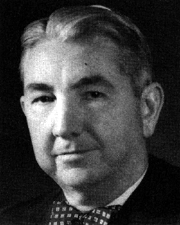Tom Clark
| Tom C. Clark | |||
|---|---|---|---|
| |||
| Former Associate Justice of the U.S. Supreme Court From: August 19, 1949 – June 12, 1967 | |||
| Nominator | Harry Truman | ||
| Predecessor | Frank Murphy | ||
| Successor | Thurgood Marshall | ||
| 59th Attorney General of the United States From: June 27, 1945 – July 26, 1949 | |||
| President | Harry Truman | ||
| Predecessor | Francis Biddie | ||
| Successor | J. Howard McGrath | ||
| Information | |||
| Party | Democrat | ||
| Spouse(s) | Mary Ramsey | ||
| Religion | Presbyterian | ||
Thomas Campbell Clark (September 23, 1899 – June 13, 1977), known as Tom C. Clark, served as the United States Attorney General from 1945 to 1949 and, after appointed by President Harry S. Truman, served as an Associate Justice of the Supreme Court of the United States from 1949 to 1967.
Justice Clark was the only Texan to have ever served on the U.S. Supreme Court, having graduated from the University of Texas in 1922. Clark resigned prematurely from the Court in 1967 when his son Ramsey Clark became Attorney General. As a retired Justice Clark was authorized to preside in eleven U.S. Circuits and in federal district court.
Clark is best known for his coverup of the Amerasia spy case. When foreign service officer John Stewart Service was arrested in 1945 for passing secrets to the pro-Communist magazine Amerasia, presidential assistant Lauchlin Currie went to former FDR chief of staff Thomas Corcoran, who in turn went to Attorney General Tom Clark. Service was not indicted, and Amerasia owner Philip Jaffe, a close associate of CPUSA General Secretary Earl Browder, got off with a small fine. The value to the Soviets of the Amerasia espionage operations, protected by corruption and special favors was grasped only after the decryption of the Venona messages.[1]
Justice Clark voted with the Warren Court on criminal law, writing the majority opinion in the "exclusionary rule" case of Mapp v. Ohio. Justice Clark also wrote the opinion invalidating daily Bible readings in public schools in Abington School District v. Schempp.
President Truman became angry at Justice Clark when he voted against Truman's seizure of the steel mills in Youngstown Sheet and Tube Co. v. Sawyer, despite Truman's impression that Clark supported as Attorney General the legality of the seizure.
References
- ↑ Novak, Robert (December 25, 2000). Stalin's Agents. Washington Examiner.
External links
- SENATORS MAY CALL CLARK ON AMERASIA; Justice 'Has Nothing to Say' on Case--Vardaman Repeats at Inquiry Denial of Link Action Forced by Truman via The New York Times, published June 9, 1950
